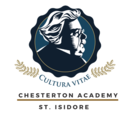GRADE 9: ANCIENT WORLD
GRADE 10: EARLY MEDIEVAL PERIOD
GRADE 11: HIGH MIDDLE AGES TO THE RENAISSANCE
GRADE 12: MODERN WORLD
LITERATURE
Our study of literature is tied to the study of history and the rest of the humanities. Students are first introduced to classical epics of Homer and then exposed to early English classics such as The Canterbury Tales and modern literary renderings of medieval history. Moving towards the modern period, they read Dante, Shakespeare, Dickens, Dostoevsky, Chesterton, and American Literature. Reading and writing go hand in hand, and each student masters the art of the essay in their writing assignments in all subjects.
HISTORY
The history classes at Chesterton Academy form the backbone of our curriculum. The four-year history sequence covers ancient history through the Greek and Roman civilizations, early Church history, the Middle Ages, the Renaissance, and the Reformation and Counter reformation. In senior year, students study the modern era, including the American and French Revolutions, the Industrial Revolution, the Communist Revolution, and the Sexual Revolution. Each history course is tailored to provide a colorful backdrop for literature, art, and science classes, and also contains components reflecting our Canadian context.
PHILOSOPHY
Philosophy, “the love of wisdom,” exercises the brain while it elevates the soul. The ability to understand abstract concepts leads to clear and systematic thinking in all things. We use philosophy to connect the humanities, but also to show its obvious connection to logic and mathematics. We study the development of philosophy from its classical roots focusing on Plato and Aristotle, its dramatic encounter with the early Church, its christening by St. Thomas Aquinas, and its deterioration in the modern era.
THEOLOGY
Theology, “the study of God,” is the context by which all other texts are studied. The principal theological texts studied are the Bible and the Catechism of the Catholic Church. We also read selections from the Church Fathers, Documents of the Church Councils, and Papal Encyclicals.
FOREIGN LANGUAGE
The study of a foreign language is required of all students for three years. All students are required to take two years of Latin and then go on to choose Latin III and IV, or a study of French as a Second Language.
